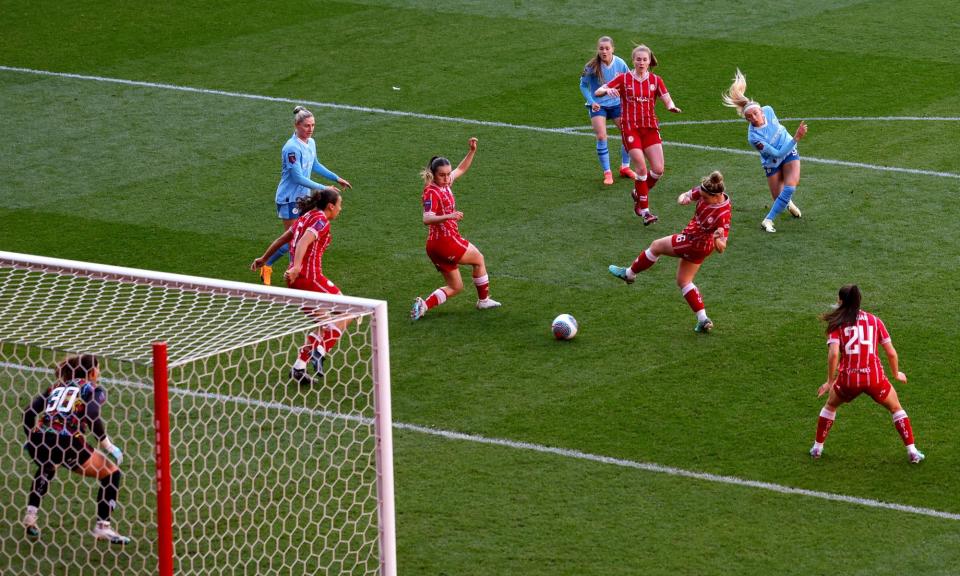Bristol City’s relegation hammers home stark financial realities of WSL

As the clock hit full time at Ashton Gate on Sunday evening, Bristol City finally succumbed to the inevitable. Relegation was confirmed after a 4-0 defeat to Manchester City, a final nail in the coffin in their Women’s Super League campaign. Only 371 days after achieving promotion, the Robins were condemned to the Championship to start rebuilding once again.
The table does not lie. With only one win all season – a thrilling 3-2 triumph at West Ham in November – Bristol City’s struggles have been evident. Their defensive problems, in particular, have been impossible to ignore. Context is key, however, particularly in a sport where the parameters are quickly shifting.
The odds were stacked against Lauren Smith’s side as soon as they lifted the Championship trophy in April 2023. “It was a relegation fight before we even kicked the ball,” says Smith. As one of only two teams in the WSL without the backing of a Premier League side – Leicester City are the other and they are an incomparable operation – they have had to be creative in their approach.
With a tight budget, Smith and her staff were always restricted by who they could recruit. Adding the experience of Megan Connolly and Satara Murray while retaining the services of Rachel Furness were all sensible moves. It could not be predicted, however, that two of those three, along with the long-serving forward Abi Harrison, would spend much of the season on the sidelines. The injury list has been extensive: Fran Bentley, the No 1 goalkeeper, picked up a knee problem; Kaylan Marckese and Jess Simpson were brought in on loan but soon returned to their parent clubs after suffering ACL injuries. Brooke Aspin and Naomi Layzell, stalwarts of the backline, have also been unavailable at points. When you are in a dogfight, you need luck to go your way.
The injury pile-up has meant that Smith has had to rely on her younger players. Bristol City have fielded the youngest average lineup in the division (24 years, 136 days) and given more minutes to teenagers than anyone else. While developing their academy players has been a core ethos of the club, and one that should be admired, it has been a baptism of fire. “There’s been big spells where we’ve had academy players on our bench, which is great in terms of our academy and they’re available to do it,” Smith says. “However, it’s a big gulf between academy football and the WSL and it’s a big ask.” They could add only three players in January, in a transfer window that, on reflection, should have been more of a priority.
With Bristol City’s fate sealed, the rebuild will start with a focus on the successes they have had. Off the pitch they have cultivated one of the better match-day experiences, attracting an average attendance of more than 7,000, the fifth highest in the WSL.
It is to the club’s credit that Gavin Marshall, chief executive of Bristol Sport Group, made an immediate statement of commitment to the women’s team on Sunday night. The juxtaposition between their response and Reading’s last season – the Royals were moved to a part-time model once relegation was confirmed – is stark and provides hope.
The challenge will be significant with investment only increasing. The Championship is intensely competitive and immediate success is far from guaranteed. This year’s champions, Crystal Palace, have increased the resources available to the team only over the past couple of years. How they make the step up remains to be seen, especially given the fast-track nature of their rise. But there will be less anxiety given the foundations already in place.
For Bristol City, the future is uncertain but far from disheartening, despite the growing disparity in finances. Player retention is crucial, as is continued faith in Smith, widely regarded as one of the brightest young managers around.
They are the heart of women’s football for the south-west and a beacon of their community. Their underdog status will endure. “Women’s football is at a key point,” Smith said on Sunday night. “Nobody knows what it’s going to look like in the next few years … we want to be part of that. The players, the club and I are ambitious to make sure that, just like last time, we are committed to going back up.”
Get in touch
If you have any questions or comments about any of our newsletters please email moving.goalposts@theguardian.com. And a reminder that Moving the Goalposts runs twice-weekly, each Tuesday and Thursday.
This is an extract from our free weekly email, Moving the Goalposts. To get the full edition visit this page and follow the instructions.

 Yahoo Sport
Yahoo Sport 






































